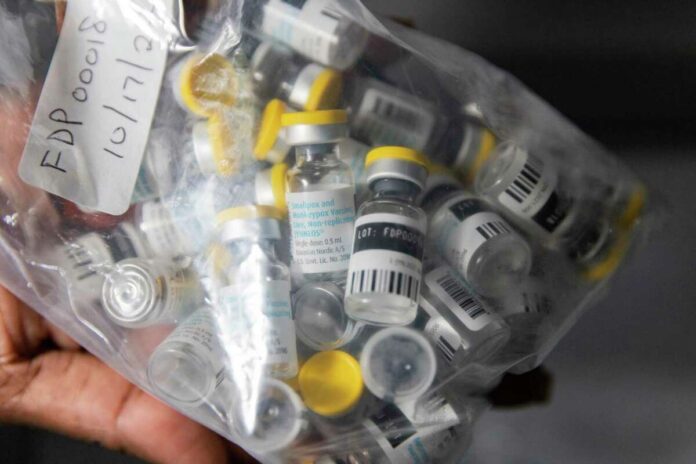
Vials of single doses of the vaccine for monkeypox are seen at a vaccinations site in New York.
Associated Press
Just when the world has begun to come to some understanding of the COVID-19 pandemic and its implications, we are confronted with the global outbreak of monkeypox. As a part of the generation that faced the HIV/AIDS crisis, and as someone whose life was personally touched by the loss of life during the AIDS epidemic, I am acutely aware of the similarities between these diseases as we see more and more instances of monkeypox in our population — similarities such as fear, ignorance, stigma and discrimination.
In 1981, the first case of AIDS was identified in the U.S. The press reacted quickly, naming it Gay Man’s Pneumonia and later, Gay Cancer. Of course, we soon learned that it was neither pneumonia nor cancer, and by year’s end 130 of the initial 321 cases, which included adults, adolescents and even children under the age of 13, had proven fatal. In the spring of 1982, The New York Times published the first mention of the term “GRID” or Gay-Related Immune Deficiency. This, once again, solidified in the minds of Americans that AIDS was a gay man’s disease, until the next erroneous and stigmatizing acronym was coined — the “4-H Club,” for homosexuals, “heroin” users, Haitians and hemophiliacs.
The misnomers and isolationist attitudes, combined with the lack of accurate information or widespread education, drove enormous chasms between the gay and straight communities. Extreme bias led to increased instances of violent crime against gay men and lesbians. In fact, it was not until 1987, six years after the first case of AIDS in the U.S., that the CDC launched the first campaign of public service announcements saying that everyone is at risk. In effect, they were finally admitting that AIDS was not a gay man’s disease — long after evidence of AIDS among hemophiliacs and intravenous drug users.
In the same way, we see the press seemingly exacerbating the notion that monkeypox is a gay disease, solely sexually transmitted. While monkeypox is currently more prevalent in circles of sexually active gay men, the disease cannot be simply defined as a consequence of gay sex. It is transmitted by contact with open lesions, respiratory droplets and even in some instances shared surface contact. Anyone can contract the disease; there have even been anecdotal cases of transmission from human to dog and from paper money to a woman. And yet the bias against gay and bisexual men remains.
The best ways to combat the discrimination against homosexuals and bisexuals that has been ignited by monkeypox are communication and education. One lesson we should have learned from the mishandling of early COVID-19 is how to share data, observations and findings in order to ensure the safety of all U.S. citizens. The health care system in the U.S. is highly fragmented with major social inequities; care varies depending on state, community, insurance and health care network. However, with a unified front we can get accurate information to all health care providers and to the media to disseminate. We must educate the general public not only to minimize the spread of disease, but also to eliminate the negative bias towards members of the LGBTQ community.
We need to get in front of and acknowledge the stigma associated with the disease. It is my hope that if we keep the lines of communication open, and if we talk to one another and spread the learnings as we learn them, then we will all become better able to react to future health crises. Even when a disease is more prevalent in one segment of our population, we should not use that as a reason to stoke ignorance and spread fear and isolation. Instead, let us spread hope, humanity and tolerance. As Albert Einstein said, “Learn from yesterday, live for today, hope for tomorrow.”
Dr. Gary Blick, of Stratford, is an HIV/AIDS clinician, clinical researcher, lecturer and humanitarian. He is the founder and clinician at Health Care Advocates International.









